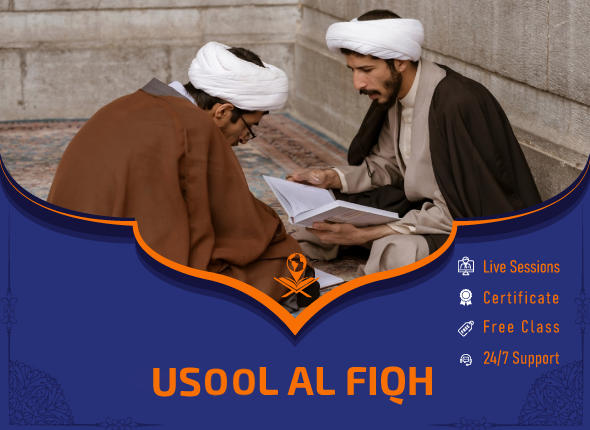
Usool Al Fiqh Course
Course Definition: Usul al-Fiqh (Principles of Islamic Jurisprudence)
The Knowledge of Usul al-Fiqh:
Usul al-Fiqh (أصول الفقه) is one of the greatest and most essential sciences in Islamic scholarship. It is the discipline upon which scholars (ʿulamāʾ) rely in determining legal evidences, formulating rulings, and deriving ahkām sharʿiyyah (Shari‘ah rulings). Its position within the Islamic sciences is of immense value, as it connects directly to understanding divine rulings and uncovering their underlying wisdoms (ʿilal).
Definition of Usul al-Fiqh
-
Usul (أصول): the plural of Asl, which linguistically means “that upon which something else is built.”
-
Fiqh (فقه): in its technical sense, is the knowledge of the practical rulings of the Sharī‘ah derived from their detailed evidences.
-
Usul al-Fiqh (أصول الفقه) in technical terms: is the knowledge that examines the general evidences of fiqh, the methods of deriving benefit from them, and the conditions of the one who derives rulings (mujtahid).
Main Sections of Usul al-Fiqh
The science of Usul al-Fiqh is typically divided into four comprehensive sections:
-
Explaining the Rulings (الأحكام الشرعية):
Covers categories such as obligation (wujūb – الوجوب), prohibition (taḥrīm – التحريم), recommendation (istiḥbāb / nadb – الاستحباب/الندب), dislike (karāhah – الكراهة), permissibility (ibāḥah – الإباحة), condition (sharṭ – الشرط), cause (sabab – السبب), validity (ṣiḥḥah – الصحة), and invalidity (fasād – الفساد). -
Studying the Evidences (الأدلة الشرعية):
This includes the Qur’an, the Sunnah, ijmāʿ (إجماع – consensus), qiyās (قياس – analogy), in addition to subsidiary proofs such as istiḥsān (juristic preference), qawl al-ṣaḥābah (the statements of the Companions), maṣlaḥah mursalah (unrestricted public interest), and sad al-dharāʾiʿ (blocking the means to harm). -
Understanding the Meanings of Evidences (دلالات الألفاظ):
Focuses on general and specific (ʿāmm / khāṣṣ – العام / الخاص), absolute and restricted (muṭlaq / muqayyad – المطلق / المقيّد), clear and ambiguous (ẓāhir / mujmal – الظاهر / المجمل), command and prohibition (amr / nahy – الأمر / النهي), and the study of abrogation (al-nāsikh wa al-mansūkh – الناسخ والمنسوخ). -
The Conditions of the Inference and the One Who Infers (المستدل والمستدل به):
Discusses the qualifications of the mujtahid, the process of ijtihād, the rulings of taqlīd (legal following), the conditions of fatwā, and the etiquette of the mufti.
Importance and Benefits of Studying Usul al-Fiqh
Studying Usul al-Fiqh provides numerous intellectual and practical benefits, including:
-
Empowering the student to deduce rulings from secondary evidences with precision.
-
Facilitating the process of ijtihād and addressing new cases with appropriate rulings.
-
Understanding the rules of fatwā, along with the conditions and etiquette of issuing legal verdicts.
-
Safeguarding Islamic law from distortion, whether through unwarranted openness to new sources or through excessive rigidity by denying ijtihād.
-
Establishing rules for scholarly debate and dialogue based on sound evidence.
-
Appreciating the tolerance and mercy of the Sharīʿah, and recognizing its wisdom and objectives (maqāṣid al-sharīʿah).
-
Reconciling between seemingly contradictory evidences and responding to doubts raised against the Qur’an and Sunnah.
-
Preserving the Sharīʿah by protecting both its sources and its rulings from neglect or misinterpretation.
-
Preventing the misinterpretation of Qur’anic and Prophetic texts according to personal whims, by setting universal and agreed-upon interpretive principles.
-
Promoting unity by avoiding sectarian disputes rooted in misinterpretation, and harmonizing between the schools of ahl al-ḥadīth and ahl al-raʾy.
-
Developing the jurisprudential faculty (malakah fiqhiyyah) that enables scholars to correctly understand, analyze, and apply rulings.
-
Reducing sectarian fanaticism by providing the student with the ability to weigh between different madhāhib (schools of law) and evaluate opinions based on evidence.
Key Terms in Usul al-Fiqh
-
Ijtihād (الاجتهاد): exerting effort to derive rulings from the evidences.
-
Ijmaʿ (الإجماع – Consensus): the agreement of qualified scholars of the Ummah after the Prophet ﷺ on a legal ruling.
-
Qiyās (القياس – Analogy): extending a ruling from an original case to a new case due to a shared effective cause.
-
Sharʿ man qablana (شرع من قبلنا): rulings revealed to previous nations that remain valid unless abrogated.
-
ʿUrf (العرف – Custom): common practice accepted by people, provided it does not contradict Sharīʿah.
-
Sad al-dharāʾiʿ (سد الذرائع – Blocking the means): preventing harm by closing the doors that lead to it.
-
Maṣlaḥah mursalah (المصلحة المرسلة – Unrestricted interest): public benefit not explicitly addressed by the Sharīʿah but consistent with its objectives.
-
ʿIllah (العلّة – Effective cause): the underlying reason that necessitates a ruling.
-
Sharṭ (الشرط – Condition): what a ruling depends upon for its validity.
-
Māniʿ (المانع – Impediment): what prevents a ruling from being established despite the presence of its cause.
-
Amr (الأمر – Command): an authoritative instruction to perform an act.
-
Nahy (النهي – Prohibition): an authoritative instruction to abstain from an act.
-
ʿĀmm and Khāṣṣ (العام والخاص – General and Specific): linguistic expressions that include all cases or restrict them.
-
Muṭlaq and Muqayyad (المطلق والمقيد – Absolute and Restricted): terms that apply without condition or with limitation.
-
Manṭūq and Mafhūm (المنطوق والمفهوم – Explicit and Implicit meaning): what is directly stated versus what is understood indirectly from the text.
This structured approach equips the student with both theoretical foundations and practical tools to approach Islamic jurisprudence with clarity, depth, and scholarly discipline.
By mastering these principles, students will develop a clear framework for understanding how Islamic law is derived, applied, and contextualized across different times and places. The course emphasizes both classical scholarship and contemporary relevance, equipping learners with analytical tools to engage with fiqh in a systematic and disciplined manner.
This course is essential for anyone pursuing advanced Islamic studies, aspiring to gain a deeper appreciation of Sharī‘ah, or wishing to understand the balance between textual fidelity and contextual application in Islamic jurisprudence.









